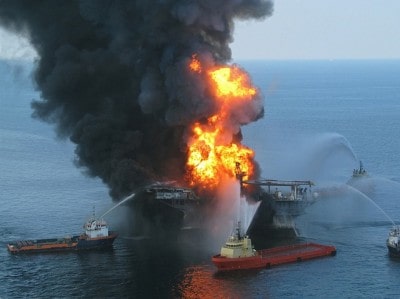
After the disastrous BP oil spill a few years back, clean up crews dumped over 7 million liters of a dispersant called Corexit into the water, in hopes that it would break down the oil and help with the clean-up efforts. However, at the time many activists protested the plan, saying that Corexit was a dangerous and toxic chemical that could make the problem worse, and as it turns out, the activists were right.
A new study by Samantha Joye at the University of Georgia showed that microbes in the water that would have helped break down the oil had instead developed to break down the dispersant.
During the Deepwater Horizon oil well blowout in the Gulf of Mexico, the application of 7 million liters of chemical dispersants aimed to stimulate microbial crude oil degradation by increasing the bioavailability of oil compounds. However, the effects of dispersants on oil biodegradation rates are debated. In laboratory experiments, we simulated environmental conditions comparable to the hydrocarbon-rich, 1,100 m deep plume that formed during the Deepwater Horizon discharge. The presence of dispersant significantly altered the microbial community composition through selection for potential dispersant-degrading Colwellia, which also bloomed in situ in Gulf deep waters during the discharge. In contrast, oil addition to deepwater samples in the absence of dispersant stimulated growth of natural hydrocarbon-degrading Marinobacter. In these deepwater microcosm experiments, dispersants did not enhance heterotrophic microbial activity or hydrocarbon oxidation rates. An experiment with surface seawater from an anthropogenically derived oil slick corroborated the deepwater microcosm results as inhibition of hydrocarbon turnover was observed in the presence of dispersants, suggesting that the microcosm findings are broadly applicable across marine habitats. Extrapolating this comprehensive dataset to real world scenarios questions whether dispersants stimulate microbial oil degradation in deep ocean waters and instead highlights that dispersants can exert a negative effect on microbial hydrocarbon degradation rates.
The whole Gulf of Mexico is completely contaminated with oil and the toxic chemicals that were used to treat the spill. Many of the sea creatures in the gulf are now poisoned, and it will not be safe to fish in these waters for years. There is no telling whether the damage from this disaster will ever be fully repaired. The Exxon-Valdiz oil spill in 1989 was a fraction of the size and it is still being cleaned up.
This leak was one of the worst manmade environmental disasters in human history and could have been easily prevented if BP and Halliburton had spent some money to upgrade their safety mechanism. Unfortunately, during a time of record profit’s the companies running this oil rig were unable to spend the meager amount that was required to prevent this catastrophe. These cut corners led to a horrific 3-month ordeal which dumped 185 million gallons of crude oil into the Gulf of Mexico.
Learn more about Corexit:
John Vibes is an author and researcher who organizes a number of large events including the Free Your Mind Conference.
This article (Study Reveals that Oil Dispersants Used To Clean Up BP Spill Actually Made The Problem Worse) is free and open source. You have permission to republish this article under a Creative Commons license with attribution to the author and TrueActivist.com.


